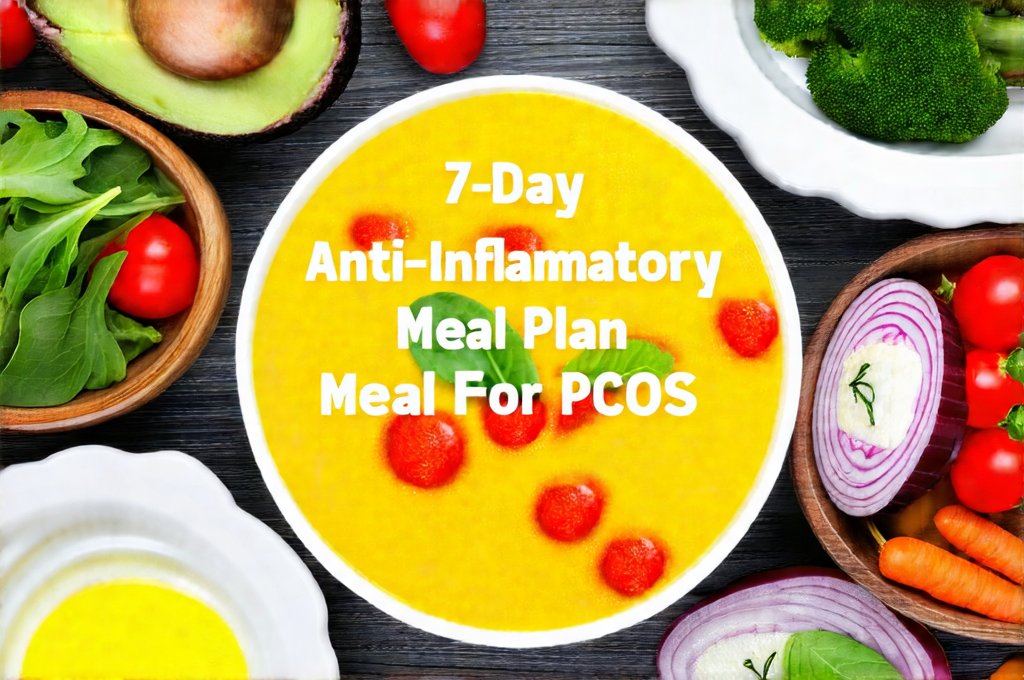Polycystic Ovary Syndrome (PCOS) affects millions worldwide, often presenting with symptoms like irregular periods, hormonal imbalances, and challenges with fertility. While there’s no single cure for PCOS, dietary changes are increasingly recognized as a powerful tool in managing its effects. Chronic inflammation is frequently linked to the development and progression of PCOS, exacerbating insulin resistance and disrupting hormone regulation. This means focusing on an anti-inflammatory diet isn’t just about feeling better; it’s about addressing one of the root causes contributing to this complex condition.
Many conventional dietary recommendations can inadvertently worsen PCOS symptoms. Highly processed foods, excessive sugar intake, and a lack of essential nutrients contribute to systemic inflammation, making hormone imbalances more difficult to manage. An anti-inflammatory diet, conversely, emphasizes whole, unprocessed foods rich in antioxidants, healthy fats, fiber, and phytonutrients – the very things that help calm the inflammatory response within the body and support hormonal harmony. This 7-day meal plan is designed as a starting point, offering practical strategies and delicious recipes to incorporate these beneficial changes into your daily life. It’s important to remember individual needs vary, so listen to your body and adjust accordingly.
Understanding Inflammation & PCOS
Inflammation isn’t always negative; it’s a natural part of the immune system’s response to injury or infection. However, chronic inflammation – the kind that persists over long periods – is detrimental to overall health and plays a significant role in many chronic diseases, including PCOS. In individuals with PCOS, inflammatory markers are often elevated, contributing to insulin resistance, which then leads to higher levels of androgen hormones (like testosterone). This hormonal imbalance disrupts ovulation and can cause other symptoms associated with the syndrome.
The link between inflammation and insulin resistance is particularly strong in PCOS. When cells become resistant to insulin, the body compensates by producing more, leading to hyperinsulinemia. High insulin levels further stimulate androgen production, creating a vicious cycle. Dietary choices significantly influence inflammatory processes. Foods high in refined carbohydrates and sugar trigger rapid spikes in blood glucose, prompting an inflammatory response. Conversely, foods rich in antioxidants and healthy fats help reduce inflammation and improve insulin sensitivity.
Adopting an anti-inflammatory diet isn’t about deprivation; it’s about making mindful food choices that nourish your body and support hormonal balance. It’s about prioritizing whole foods over processed alternatives and incorporating a variety of nutrient-dense options into your meals. This approach can contribute to improved metabolic health, reduced inflammation, and better management of PCOS symptoms – all while enjoying delicious and satisfying food.
7-Day Anti-Inflammatory Meal Plan Overview
This meal plan focuses on incorporating anti-inflammatory foods throughout the week. It’s designed to be flexible; feel free to swap meals based on your preferences and dietary needs. Portion sizes should be adjusted based on individual caloric requirements and activity levels. The core principles include:
– Emphasizing whole, unprocessed foods like fruits, vegetables, lean proteins, and healthy fats.
– Limiting refined carbohydrates, sugar, and processed foods.
– Incorporating anti-inflammatory powerhouses like fatty fish (salmon, mackerel), berries, leafy greens, nuts, and seeds.
– Prioritizing consistent meal times to help regulate blood sugar levels.
Here’s a glimpse of what you can expect over the 7 days: breakfasts will often feature oatmeal with berries and nuts or eggs with avocado toast; lunches might include salads with grilled chicken or fish, or lentil soup; dinners will focus on lean protein sources paired with plenty of vegetables and healthy carbohydrates like quinoa or sweet potatoes. Snacks will be focused on whole foods like a handful of almonds or Greek yogurt with fruit. Hydration is also key – aim for at least 8 glasses of water per day.
Sample Meal Plan Breakdown (Days 1-3)
Day 1: Breakfast – Oatmeal with berries and a sprinkle of chia seeds; Lunch – Large salad with grilled salmon, mixed greens, avocado, and olive oil vinaigrette; Dinner – Baked chicken breast with roasted sweet potatoes and steamed broccoli. Snack – A small handful of almonds.
Day 2: Breakfast – Scrambled eggs with spinach and whole-wheat toast; Lunch – Lentil soup with a side of whole-grain bread; Dinner – Turkey meatballs with zucchini noodles and marinara sauce. Snack – Greek yogurt with blueberries.
Day 3: Breakfast – Smoothie made with spinach, banana, almond milk, and protein powder; Lunch – Leftover turkey meatballs and zucchini noodles; Dinner – Salmon baked with lemon and herbs, served with quinoa and asparagus. Snack – Apple slices with peanut butter.
Recipe Spotlight: Anti-Inflammatory Salmon with Roasted Vegetables
This recipe is a cornerstone of the plan, providing healthy fats, lean protein, and essential nutrients.
1. Preheat oven to 400°F (200°C).
2. Toss chopped vegetables (broccoli, bell peppers, zucchini) with olive oil, herbs (rosemary, thyme), salt, and pepper. Roast for 20-25 minutes.
3. Season salmon fillets with lemon juice, garlic powder, paprika, and a pinch of cayenne pepper.
4. Place salmon on a baking sheet lined with parchment paper and bake alongside the vegetables for 12-15 minutes, or until cooked through.
This meal is not only delicious but also packed with nutrients known to combat inflammation. Salmon provides omega-3 fatty acids, which have potent anti-inflammatory properties. The colorful vegetables offer antioxidants that protect against cellular damage. This type of meal exemplifies the power of food as medicine in managing PCOS symptoms and supporting overall well-being. Remember to adjust seasonings to your liking and explore different vegetable combinations.
This 7-day plan is a starting point, not a rigid prescription. It’s about building sustainable habits that support your health journey with PCOS. The goal is to create a lifestyle centered around nourishing foods that reduce inflammation, balance hormones, and empower you to feel your best. Don’t hesitate to consult with a registered dietitian or healthcare professional for personalized guidance tailored to your individual needs and circumstances.




